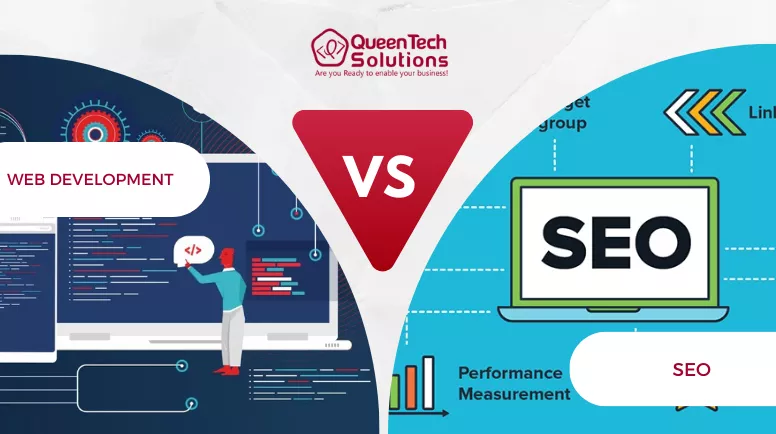- October 26, 2023
- Posted by: Jacky Melek
- Categories: Software Development, Website Development, Digital Marketing, Search Engine Optimization (SEO)

Upon the completion of the website by the developers, it was received with great enthusiasm. However, a subsequent request from the SEO team outlined a series of modifications that would significantly impact the website’s aesthetics and navigation, leading to the unpreparedness of the web development team.
Viewing the situation from the perspective of a website SEO consultant, we find the following key points to consider:
What is Web Development?
Web development involves the creation of websites and applications for both the internet and intranet. This process includes various stages such as planning, designing, coding, testing, and debugging.
It requires the utilization of multiple technologies and a dedicated team to build websites, ranging from simple single-page portfolios to complex and user-friendly healthcare platforms. Websites for various purposes, including blogs, social media, and e-commerce, are developed using coding and various integrated technologies.
What is SEO?
SEO (Search Engine Optimization) refers to the process of implementing changes on a website to enhance its likelihood of achieving higher rankings in search engine results.
A brief explanation of the crawling process involves bots scouring the internet to find new and updated content. After discovering a page, Google renders it, determining the query it addresses, and then indexes (adds) it to the database. Google aims to display the most pertinent and high-quality page for the query, employing over 200 factors to rank the content.
These ‘ranking factors’ can be divided into three main categories:
- On-Page SEO: This pertains to optimizing content and copy to ensure it is easily understandable to users and accessible to Google crawlers.
- Off-Page SEO: Actions conducted outside of the website that influence its visibility, such as building backlinks, promotional activities, and guest posts.
- Technical SEO: This involves fine-tuning the website’s code and server configuration to facilitate better crawling, including aspects like page elements, HTTP header responses, XML Sitemaps, and redirects.
Web Development vs SEO and Where they Overlap?
The most crucial component of an SEO strategy is technical SEO. If the website’s technical setup is not correctly configured, the efforts put into on-page and off-page optimization may not yield the desired results.
Most companies do not have dedicated technical SEO professionals, leading to instances where SEO specialists often need to persuade developers to implement their recommendations. Developers typically work within specific guidelines and constraints regarding changes to a website.
Consequently, there might appear to be a divide between SEO and web developers, even though both share the common goal of providing a positive user experience.
Web development teams that recognize the significance of SEO strive to find common ground and incorporate essential SEO practices into the web development process. This practice is commonly known as Web Development SEO.
How do web development and SEO go together in website SEO consultant?
- Mobile-friendly design
- Website functionality
- Website speed optimization
- Website structure enhancement
- Website design for optimal user experience
- Website security measures
- URL optimization
- Image optimization
- Code optimization
- Page’s metadata refinement
- Website hosting
- Indexation strategies
Mobile Friendly

The prominence of mobile devices in global internet traffic, accounting for 60% of the total, underscores the significance of mobile-friendly design. Google primarily assesses and indexes the mobile version of websites, potentially overlooking the desktop version if mobile compatibility is lacking.
However, ensuring mobile friendliness represents just one facet of comprehensive web design.
With the emergence of foldable phones, smart TVs, smart fridges, and smartwatches, the range of screen sizes has expanded considerably. While SEO specialists advocate for a fully responsive website, the onus ultimately falls on web developers to construct a platform that offers users a seamless browsing experience without compromising functionality.
Website Functionality
While having a website that can open on various devices is essential, ensuring optimal functionality is even more critical.
If visitors to the website are unable to read its content, they won’t be able to grasp the essence of your business. Moreover, if buttons and links are not clickable, it can disrupt the visitor’s journey on the site. Similarly, malfunctioning forms can hinder their ability to reach out to you.
A proficient website builder prioritizes the seamless performance of every element on the website to guarantee a smooth and effective user experience.
Website Speed

The disparity between Web Development and SEO often centers around page speed, a critical factor that SEO specialists prioritize, particularly with the emphasis on fast-loading websites and core web vitals.
The web development team comprehends the constraints of various technologies and is aware of the potential repercussions if prioritizing speed compromises functionality and security.
Nonetheless, web developers who grasp the intricacies of SEO undertake additional measures to enhance website speed without undermining essential aspects such as functionality and security.
Website Structure
Developers often prioritize a flat website structure for its speed and mobile user-friendliness. Conversely, SEO specialists advocate for prominently displaying crucial links on the homepage.
Numerous SEO experts recommend ensuring that every web page is accessible within three clicks from the homepage, necessitating extensive internal linking. The creation of a well-structured website sitemap and robust Information Architecture (IA) relies heavily on the collaborative efforts of both web development and SEO teams through different content management systems.
Website Design
Website design and user experience (UX) are instrumental in retaining hard-earned visitors and ensuring their engagement.
SEO and user experience specialists closely monitor visitor behavior on the website, identifying areas where users may disengage. They offer recommendations based on their research, which then need to be implemented by the development team.
In addition, incorporating clear calls to action, managing the presence of pop-ups, and conducting A/B testing for website copy and color are among the various strategies employed to enhance the website’s overall usability and appeal.
Website Security
The development team places a premium on website security, considering it a matter of their reputation. At times, this emphasis on security takes precedence over speed and functionality.
For SEO specialists, SSL certificates represent a major area of focus. Given Google’s preference for websites to load on HTTPS, SEO teams advocate for this security measure. Consequently, developers promptly integrate SSL certificates into the website to align with these SEO requirements.
URL Optimization
The clash between the developer’s team and SEO often stems from incidents involving the mishandling of URLs during website migration.
A page URL serves as the address of the page. If a page is relocated to a new address without appropriate redirection, it can result in 404 errors for backlinks, internal links, and social media shares associated with the original URL.
From a technical standpoint, a website might have various domain variants, such as:
- http://www.example.com
- http://www.example.com/
- https://www.example.com
- https://www.example.com/index.php
- https://www.example.com/
Web Development SEO ensures that all domain URL variants possess canonical tags and redirect to a single primary domain URL, thereby streamlining the website’s structure and avoiding potential errors.
Image Optimization

While many web developers source icons and images from free image websites, the task of image optimization typically falls within the domain of digital marketing.
When a website contains a substantial volume of images, developers often resort to automating the process of populating alt tags. Image alt text serves to assist individuals with visual impairments, enabling them to listen to the page content, thus enhancing the overall user experience.
Furthermore, images must be compressed to preserve website speed, ensuring an optimal browsing experience for visitors.
Code optimization (Java, HTML, CSS minification)
The emphasis on code minification by speed optimization tools has led to even SEO specialists gaining a comprehensive understanding of this practice. Competent web developers prioritize code minimization and enable Gzip compression to enhance website speed.
Given that code minification and Gzip compression involve server configuration and .htaccess file editing, SEO professionals are unable to implement these optimizations independently. When web development is undertaken collaboratively with SEO, the team can proficiently write and optimize code to maximize website speed.
Page’s Metadata
Metadata, comprising the meta title and meta description, plays a crucial role in how a website appears on the Google search page.
Developers commonly do not prioritize updating the meta title of pages, often resulting in randomly generated, unreadable page names.
SEO teams step in post-production to incorporate relevant keywords into the title and description. When SEO and web development collaborate effectively, the page’s metadata is optimized for SEO right from its launch.
Indexation
The web development companyand website seo consultant typically operates on the staging environment, keeping the website set to ‘noindex’ to prevent accidental visibility on Google.
When a website is marked as ‘noindex,’ it indicates that crawlers are barred from exploring its content. Ideally, SEO specialists prefer to index the website before its launch, as the processes of crawling and indexing can be time-consuming.
JavaScript presents another challenge, as it can complicate crawling due to client-side rendering. While JavaScript enhances functionality, it can limit website features as HTML renders more easily.
Website Hosting
Small businesses should prioritize finding web hosting solutions that are scalable, meeting their current needs while allowing for future growth. It’s crucial to select an option that is budget-friendly and enhances performance, possibly through search engine optimization services.
This ensures that the hosting solution not only caters to present demands but also supports the business’s expansion while maintaining cost-effectiveness and optimizing online visibility.
Conclusion
Web developers and SEO teams must strike a balance between ensuring website accessibility and determining the appropriate timing for indexing to optimize search engine visibility.
Ready to take your website to the next level? Partner with QTS software company and digital marketing agency for top-notch digital solutions tailored to your needs. Explore our offshore software development to provide your business comprehensive services, call ustoday!



